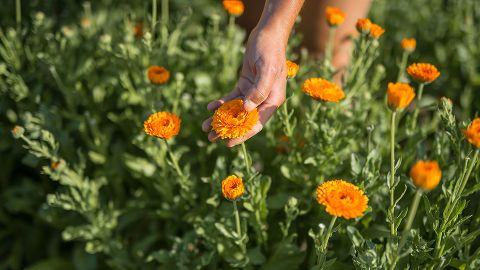Our raw materials

The ethical sourcing of raw materials for our products is particularly important to us. Therefore, we have been a member of the Union for Ethical Biotrade since 2011.
Our supply chain is sustainable and equitable
When you purchase our natural skin care products, you contribute to a world in which both people and biodiversity can thrive. Not only do we ensure that our natural raw materials are grown organically or biodynamically, but also that the people who grow and harvest them are treated fairly and with respect. We also want to be able to trace our natural raw materials back to their source. As a member of the Union for Ethical BioTrade (UEBT), we adhere to the strict social, economic and ecological criteria set by the organisation. The values it defines are for the benefit of both people and planet.
Our commitment to sustainable sourcing
Over 80 percent of our certifiable raw materials are sourced from certified organic farming and, wherever possible, from biodynamic farming. We are working to increase this percentage every year. Through new partnerships with certified organic producers and new organic and biodynamic cultivation projects. We also place great emphasis on the quality of our ingredients. Many of the plants we use for our natural cosmetics and medicines are grown in our own gardens. We also source raw materials through long-standing partners.
Our Vision is to be a benchmark company on ethical and sustainable sourcing within our industry.
Ethical sourcing is a top priority
We want you to know exactly what you are getting from us. Weleda has been a full member of the Union for Ethical BioTrade (UEBT) since 2011. The non-profit organization aims to contribute to a world where people and biodiversity thrive. It is committed to the regeneration of nature and a better future for people through the ethical sourcing of raw materials from biodiversity. The non-profit organization was established as an initiative of the United Nations. It maintains close partnerships with UN organizations, such as the Convention on Biological Diversity (CBD) and the UN Conference on Trade and Development (UNCTAD).
The 7 principles of the UEBT standard
- Conservation of biodiversity
- Sustainable use of biodiversity
- Fair and equitable sharing of benefits derived from the use of biodiversity
- Socio-economic sustainability (productive, financial and market management)
- Compliance with national and international legislation
- Respect for the rights of actors involved in BioTrade activities
- Clarity about land tenure, right of use and access to natural resources
Our goal is to preserve and sustainably use biodiversity to the greatest extent possible during the cultivation, harvest, and further processing of the plants. To treat all cultivation partners fairly, uphold human and labor rights, and promote community development.













